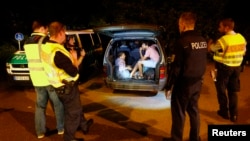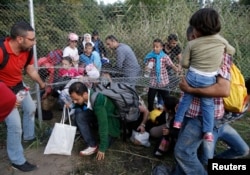Refugees and governments are suddenly in a rush to get the wave of people landing in Greece from the Middle East and Africa to their destinations, with Germany topping the list.
There's a sense that on Tuesday everything will change. Hungary will put into force new laws that will make illegal crossing punishable by three years in prison and other countries are reportedly moving soldiers to borders to crack down on illegal immigration.
In the meantime, Hungary is allowing refugees to pass freely Monday.
Omar's story
Omar, an aspiring dentist I was traveling with before I got separated in the rush, described his experience as easy and legal. He and others took a taxi out of Serbia and walked two kilometers before getting another taxi into Hungary.
"The situation was very good," he texted. For refugees with Syrian smartphones, "WhatsApp" is the only form of communication available on this leg of the trip. Those without phones rely on those who have them.
"You think it's weird Hungary says on Tuesday border closed but Monday you are welcomed?" I texted back.
"Yes," he responded, "I'm very very happy."
Warm welcome
Journalists, mostly from Sweden, greeted them warmly as they arrived. This was a particular surprise as just last week we were watching a Hungarian camera woman kicking and tripping refugees as they ran.
The police then gathered refugees on trains heading for the Austrian border.
I'm somewhere in Hungary on the road from Serbia to the border with Austria, where I've heard they're planning a crackdown.
As we drive, road signs say the border is closed, but we don't know why.
Omar and the guys are in front of me, but they won't slow down until they get to Germany so I may not catch them if the border re-opens.
Fingerprints & photos
Refugees fear little more than fingerprints and photos at borders, because they can be used as a legal way to have them deported despite other protections they're entitled to under international law.
And as Omar and his friends press on, refugees behind are not in a rush to be the ones to find how serious governments are about stopping them.
Thiaa, a young Syrian man who was living in Zaatari, a desert camp in Jordan, is now in Greece but he won't head north for several days.
"What's situation on the Hungaria border" he texted me Monday.
Thiaa says Zaatari is so depressing he would rather die than stay a fourth year.
I don't know what to tell him. Everything that's happening now may mean nothing tomorrow.







